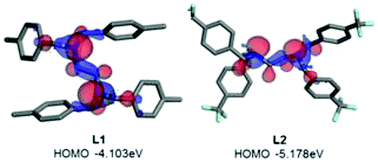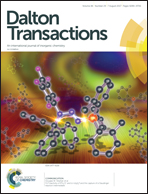Insights into the electron-donating and withdrawing effect of the functional groups on mechanochemical dehydrochlorination reactions†
Abstract
The effect of the withdrawing ability of –CF3 groups in a large and flexible bidentate ligand has been evaluated by monitoring the course of solid-state dehydrochlorination reactions. We demonstrate that the coordination bond formation does not occur by mechanochemical means from a second coordination sphere adduct. Quantum mechanical calculations have shown that frontier molecular orbital energy and net charges at N centers can justify the less reactive nature of the partially fluorinated ligand, corroborating the experimental results.



 Please wait while we load your content...
Please wait while we load your content...